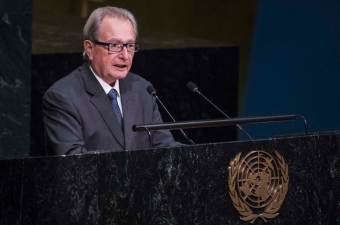ICTY President Carmel Agius today presented the Tribunal’s twenty-third Annual Report to the United Nations General Assembly. In his first address to the General Assembly as President of the ICTY, he noted that the Tribunal has continued its diligent efforts to conclude all cases in a timely manner while respecting fundamental due process and fair trial rights. In this respect, he noted that the work undertaken in the past year saw more cases disposed of than in the last reporting period.
President Agius then proceeded to outline the five main challenges facing the Tribunal in its final year, the first challenge being to ensure that the remaining cases stay on track for a timely and responsible closure of the Tribunal in 2017, and that there is a smooth transition to the International Residual Mechanism for Criminal Tribunals. This also includes the need for Member States’ to support the ICTY’s final request for extension of terms of office of the Judges.
The second key challenge identified by President Agius is that of staff retention and the prevention of accelerated staff attrition. President Agius explained that, as the ICTY nears its ultimate closure, staff members at all levels will continue to depart the Tribunal for more secure employment elsewhere. He asked for the urgent assistance of the Organization and its Member States in addressing these acute challenges, and paid tribute to the Tribunal’s “highly dedicated, talented and professional” staff.
President Agius stated that defending the integrity of the Tribunal, including enforcing a zero-tolerance policy on allegations of witness interference, will be the third main challenge. He recalled that, in a pending contempt case, the Republic of Serbia has yet to execute arrest warrants against three accused persons, and emphasized that cooperation with the Tribunal is a responsibility flowing from the Statute of the Tribunal.
Consolidating the shared legacy of the Tribunal and the United Nations is the fourth main challenge, President Agius said. To this end, the Tribunal has developed a series of legacy and closing events titled “ICTY Legacy Dialogues” and counts on the full participation of Member States. The President stated “As the Tribunal prepares to close in December 2017, ensuring that its work and achievements are accessible and impactful for stakeholders in the region of the former Yugoslavia – and abroad – is more important than ever”.
The final challenge for the ICTY in the remaining period, as stressed by President Agius, is supporting and enabling national jurisdictions to adjudicate war crimes. He added that the Tribunal is committed to assisting national authorities in the former Yugoslavia to handle the large number of remaining war crimes cases, and that the ICTY strongly supports cooperation between the states of the former Yugoslavia.
The President concluded by saying: “I have faith that, through the continued efforts and support of the international community, this bold experiment in international justice will successfully conclude on time and, in the years to come, will continue to serve as a reminder of what is possible in the fight against impunity”.


